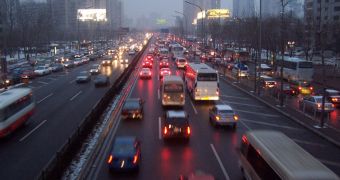Recently, the Beijing Municipal People’s Government (BMPG) has announced that it will extend its regulations on traffic flows even further than it did for the duration of the Beijing Olympics. During the games, the Chinese capital was mostly closed for traffic, as authorities desperately attempted to clear the skies over Beijing of ever-lasting smog. Apparently, the city management is not satisfied with the way things are now either, two months after all foreign delegations have left the city.
Endless jams, that were once a defining part of the Chinese capital, are new considered to be a national disgrace, and the government has taken steps to deal with this problem. A new traffic control building has been constructed, in order to regulate the flow of cars throughout the city. It will have multiple tasks, from handling stoplights to coordinating with the police and repairing infrastructure. This way, the BMPG hopes to put an end to traffic that often clogs all major routes in the city, leaving important sectors cut off from each other.
One of the measures intended to regulate Beijing's congested traffic refers to banning cars from the road altogether, although admittedly it will happen only one day per week. As a result, all cars will be forced to the parking lot on specific days, which are to be determined by the license plate they are registered with.
Thus, cars having plates ending in 1 or 6 can't travel on Monday, those ending in 2 or 7 on Tuesday, and so forth. One similar method was enforced during the Olympics, when cargo trucks and other large vehicles were banned from entering the administrative region of Beijing, starting July 1 and ending September 20.
Though these measures are typical to a socialist country, they may yet succeed where other approaches have failed. Nevertheless, China may not have the resources to maintain such a curfew, as forcing all of its heavy traffic outside the capital will undoubtedly cause severe economic losses. However, cleaner air concerns seem to prevail at the moment.

 14 DAY TRIAL //
14 DAY TRIAL //